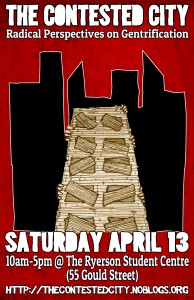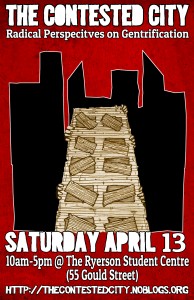 The Contested City organizers are pleased to announce the following itinerary of workshops planned for the conference. A full schedule will be posted in the coming days.
The Contested City organizers are pleased to announce the following itinerary of workshops planned for the conference. A full schedule will be posted in the coming days.
—
Anarchist Interventions in Neighbourhood Organizing
Presented by Common Cause Toronto
Neighbourhoods have unique characters and ways of responding to challenges and crises. From responding to police and horizontal violence to fighting deportations, from working against school closures to anti-gentrification campaigns, neighbourhoods in Toronto come together and struggle around different issues. As anarchists and activists, it is imperative that we not just parachute ourselves into neighbourhoods, but take the time to research and observe: what issues are catalysts for neighbourhood organizing? What strategies do people use? What has been the trajectory of organizing campaigns? This workshop will explore some of these questions, with particular reference to examples from the Parkdale neighbourhood.
Common Cause is an Ontario-based anarchist-communist organization with branches in Toronto, Hamilton, Kitchener-Waterloo and London. Members of Common Cause work to spread the anarchist principles of direct action, self-organization and direct democracy in the many front-line community, campus and labour struggles in which they are active.
—
Anti-capitalist Direct Action in Struggles Over Housing; The San Francisco Mission Yuppie Eradication Project
Presented by Kevin Keating (Skype)
The Mission Yuppie Eradication Project (MYEP) was a radical anti-gentrification campaign based in the Mission District of San Francisco in the late 1990s and early 2000s. Using simple and easily reproducible tactics, members of MYEP brought an uncompromising anti-capitalist analysis of gentrification into the national spotlight, bringing much needed attention to the market-based displacement of the neighbourhood’s majority Latin American residents by a parasitic bourgeois class. In this workshop, MYEP founder Kevin Keating looks back on the campaign in order to draw lessons that can be applied to other neighbourhoods facing the ever-present drumbeat of capitalist “redevelopment”.
—
Austerity, the 2012 Québec Student Strike and the State and Potential of the Assemblies Movement
Presented by Richard St-Pierre
The 2012 Quebec student strike started out as a battle over a planned tuition hike. However, over the course of the next six months it had swelled into a massive movement with deep roots in the community that ultimately took down the Charest government and radically transformed the city of Montreal. As the battle over tuition hikes and civil liberties heats up again, this workshop will talk about one of the lasting legacies of 2012: the fledgling neighbourhood assemblies movement of Montreal.
Born and raised in the gold mining town of Kirkland Lake, Ontario, Richard St-Pierre is a forty-six year veteran of the class struggle. Deeply inspired by the Québec general strike of 72, Richard went on to found the Comité des sans-emploi (Committee of the Unemployed) in Montreal. He currently serves as liaison delegate of the neighborhood assemblies with the student movement.
—
Drug Users not Welcome: How the targeting of drug users is an effective NIMBY strategy to push and expand gentrification
Presented by Zoë Dodd
The NIMBY phenomenon often specifically targets people who use drugs and yet there has been little discourse about the intersection of gentrification and drug users. Further more radical communities have not for the most part stood in solidarity with this particular target of gentrification. By creating a climate of fear around drug use and the drug user; communities mobilize with resident associations, police liaison committees, politicians, police and B.I.As, to displace or block services for people who use drugs (such as methadone clinics) and to harass, intimidate, incarcerate, and displace people who use drugs from their communities. In this workshop I will use examples from the Downtown Eastside of Toronto to show how a community that was once neglected and of no interest to middle class people has become a contested and rapidly gentrifying neighbourhood. People from all socio-economic classes use drugs and yet poor people who use drugs are among the most vilified and demonized group in society. Targeting drug users has become an effective tool and cover for the persecution of poor people. Radical organizing should stand in solidarity with people who use drugs. The purpose of this workshop will be to help one another understand and frame the ways in which the discrimination of drug users furthers the austerity and gentrification agendas.
Zoë Dodd is a harm reduction and drug user activist with almost a decade of front line social service experience in the Downtown East Side of Toronto. She is a member of AIDS ACTION NOW, Toronto Drug Users Union, The International Network of People Who Use Drugs, OCAP and the Toronto Harm Reduction Alliance.
—
¡El Barrio No Se Vende! ¡Se Ama y Se Defiende! / El Barrio is Not for Sale! It is to be Loved and Defended!
Presented by Movement for Justice in el Barrio
Driven by multi-national corporations and profit-seeking landlords, and facilitated by city officials, gentrification has swept New York City, causing the wholesale displacement of low-income people of colour and immigrants from their communities. East Harlem is experiencing a wave of harassment, abuse, and intimidation as greedy landlords attempt to evict the community from their homes in order to raise rents and increase profits. With over 750 members, Movement has gone door-to-door, building-to-building, and block-to-block to organize with their fellow neighbors to build a neighborhood-wide movement for dignity and justice.
The Movement for Justice in El Barrio was founded by immigrants and low-income people of color of East Harlem to fight for dignity and against neoliberal displacement. Movement operates on a commitment to self-determination, autonomy, and participatory democracy.
—
Engaging the Cityscape: Street Art as an Anti-Gentrification Tactic
Presented by Douglas Grey
The depression and alienation marginalized people feel from the gentrification of their communities is a natural reaction to being displaced and ignored. As billboards for new, pricey condos begin to cover city blocks and adverts for posh new espresso shops become commonplace, marginalized people begin to feel unwanted in their own communities. Street art can be both uplifting and empowering to the people that need it in neighbourhoods being gentrified. It can also serve to spread awareness of important social issues in an accessible way. This workshop will be an exploration of socially conscious street art and it’s potential for anti-gentrification activism. We will learn about street art methods such as stencils, stickers, seed-bombs, posters and how to make your own art supplies.
Douglas Grey is an artist who draws much of his inspiration from his working class downtown east neighbourhood.
—
Fighting Gentrification in Toronto’s Downtown East: OCAP’s campaign to save the School House shelter
Presented by OCAP
This workshop will focus on the local Downtown East campaign to save the School House shelter. We will look at what the key issues are in the fight for the School House; the crisis in the city homeless shelter and housing system, harm reduction (including ‘wet’ spaces), upscale development and gentrification in the downtown east neighborhood (including the role of institutions like Ryerson). We will also go through strategies and tactic’s in OCAP’s campaign over the last few years and where the work is headed to from here.
—
Occupy, Document, and Resist: How Poetry and Photography Shape Urban Dissent
Presented by Dale Smith
My talk describes how poetry and photography has been used to challenge institutional forms of urban control in the arts and on the streets. Framed by the actions of the Occupy Movement, my talk opens with a description of members of the Croatoan Poetic Cell, a hub of art activism housed in a below-the-radar warehouse on Chicago’s west side, and how their actions brought attention to disparities of arts funding and activism during the height of Occupy in fall 2011. The second portion of my talk describes the street photography of Vietnamese artist and poet Linh Dinh, whose documentation of urban life in areas of South Philadelphia shows ways in which the homeless, African-Americans, and others who occupy marginal spaces in urban environments participate in, and resist, institutional pressures of displacement. Both narratives are offered as a way to theorize strategies of urban engagement in the wake of Occupy.
Dale Smith is an assistant professor and poet who teaches in the Department of English at Ryerson University. His book Poets Beyond the Barricade: Rhetoric, Citizenship, and Dissent after 1960 considers public responses in poetry to wars in Vietnam, Iraq, and Afghanistan. His course ENG 560 (Poems of the City) also looks at relationships between activists and artists in diverse urban spaces. His work suggests that the close relationship between activists and artists produces meaningful connections and strategies for understanding larger forms of public engagement.
—
The City is a Battleground
Presented by Iconoclast Media
The cities in which we live are alienating spaces, constructed according to the logic of capital accumulation. Historically built to house workers in close proximity to urban sites of industrial production, today they increasingly serve as concentrated sites of consumption. The ethos of individualism promoted by the dominant culture of capitalism is often reflected in the all-too-familiar estrangement one feels from their neighbours and fellow community members. Fighting against this disconnection means developing a different perspective and approach to our surroundings. Neighbourhoods are more than mere amalgamations of shops, apartment buildings and individual houses. They are vibrant sites of culture and resistance, where those who face the daily oppression of hetero-patriarchy, ableism and white supremacy and the shared exploitation of life under capitalism can come together to fight back.
Iconoclast is an anarchist media collective operating in Southern Ontario. We wage cultural war on the stale dogma that disguises itself as the conventional wisdom of an apathetic society.


